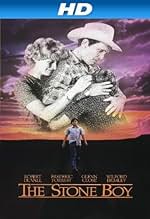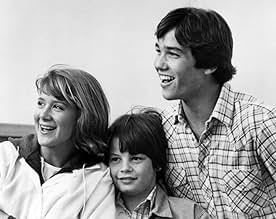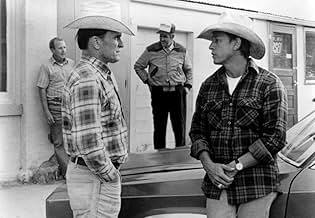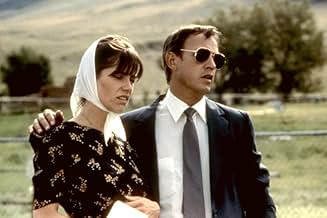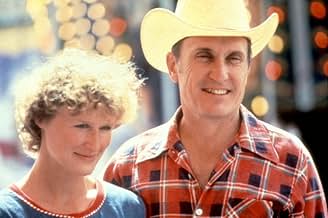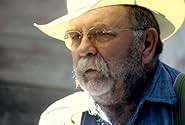A Midwestern farm family faces major emotional adjustment after a tragedy results in the death of an older brother.A Midwestern farm family faces major emotional adjustment after a tragedy results in the death of an older brother.A Midwestern farm family faces major emotional adjustment after a tragedy results in the death of an older brother.
- Awards
- 2 nominations total
Susan Rinell
- Nora Hillerman
- (as Susan Blackstone)
- Director
- Writer
- All cast & crew
- Production, box office & more at IMDbPro
Featured reviews
I had seen this film way back in the 80's and had nearly forgotten it when I noticed it was on tv again and watched it. I remembered having liked this little sleeper when I first saw it, and I liked it even better on second viewing.
All of the actors, especially Robert Duvall, Glenn Close, Wilfred Brimley, Frederic Forrest, and Jason Presson (as the twelve-year-old boy who feels responsible for the accidental shooting death of his older brother), are superb. The film has a very genuine feel to it--an understated, quiet, deeply moving story of a family aching with grief. The dialogue is sparse but telling, and the nonverbal acting is outstanding. Sort of like a simpler, rural version of Ordinary People sans psychiatrist but equally impressive family dynamics.
The Stone Boy is well worth the time and emotional energy involved in watching it.
All of the actors, especially Robert Duvall, Glenn Close, Wilfred Brimley, Frederic Forrest, and Jason Presson (as the twelve-year-old boy who feels responsible for the accidental shooting death of his older brother), are superb. The film has a very genuine feel to it--an understated, quiet, deeply moving story of a family aching with grief. The dialogue is sparse but telling, and the nonverbal acting is outstanding. Sort of like a simpler, rural version of Ordinary People sans psychiatrist but equally impressive family dynamics.
The Stone Boy is well worth the time and emotional energy involved in watching it.
The Stone Boy is a tragedy of Midwestern stoicism in the face of inconsolable grief. Arnold accidentally shoots his brother and is frozen out by his family, with the exception of his grandfather. The process for everyone is painful to watch, but handled very quietly. I was very reminded of Tender Mercies, another great Robert Duvall film. It is drama at its best and a film I recommend highly.
A family in rural Montana has their lives ripped apart after their youngest son Arnold (Jason Presson) accidentally shoots and kills his older brother Eugene (Dean Cain). The parents (Robert Duvall and Glenn Close) don't know exactly how to handle the situation afterwards as the boy seems to have no emotion about it, so it is up to his grandfather (Wilford Brimley) to help him make sense of it all.
This is perhaps as low key a drama as you could find. Director Christopher Cain (stepfather of Dean) allows for everything to unfold in a realistic fashion with nary an opportunity for over-the-top theatrics (Frederic Forrest does provide some as Close's brother). There is also a wonderful score by James Horner and beautiful cinematography by Juan Ruiz-Anchia. Presson is quite good as the lead and he would go on to be the kid no one can remember from Joe Dante's Explorers (1985). Linda Hamilton as has a small role as a lady the boy encounters on a bus. Duvall, Close and Brimley would also appear in The Natural released a month after this.
This is perhaps as low key a drama as you could find. Director Christopher Cain (stepfather of Dean) allows for everything to unfold in a realistic fashion with nary an opportunity for over-the-top theatrics (Frederic Forrest does provide some as Close's brother). There is also a wonderful score by James Horner and beautiful cinematography by Juan Ruiz-Anchia. Presson is quite good as the lead and he would go on to be the kid no one can remember from Joe Dante's Explorers (1985). Linda Hamilton as has a small role as a lady the boy encounters on a bus. Duvall, Close and Brimley would also appear in The Natural released a month after this.
On a superficial level "The Stone Boy" could be seen almost as "Ordinary People" but on a rural setting. Trade the accidental drowning for a
hunting accident but again we have an exemplary older brother dying and leaving a younger one feeling the pains of it all, and again each member of
the family tries to cope with themselves during grief and afterwards. Extend the number of family members, add a series of situations, and remove
the shrink character and you have a confusing and emotionally drained film that somehow hits some right notes. You can learn from it, specially if
paying attention to all the mistakes the characters make throughout the picture.
Jason Presson is Arnold, the boy from the title, and he enters into a very withdrawn and quiet mode after accidentally shooting his older brother during a duck hunting. Then we have the parents, where the mother (Glenn Close) tries to console him in her careful way as the father (Robert Duvall) just avoids him, prefering to leave the boy spend some time with his grandfather (Wilford Brimley). The little sister facing her early teens is unimportant, for them and for us as we don't get to see any personal crisis of hers. And if those folks weren't enough, there's the uncle (Frederic Forrest), who cheates on his pregnant wife while consoling the dead man's girlfriend and he blames the infidelity on poor Arnold.
Lots of people around yet Arnold's is all alone. It's no mystery why he doesn't talk much with anyone or even why it takes some time before he finally break down and cry. The hardness of that rural environment keeps everybody at a certain sense of composure that they have to endure everything. Everybody's all emotional unavailable except when there's some conflict involved, and deep down they would leave that house, that town and go find themselves somewhere else, apart from everything and everyone they know. They can't find ways of dealing with themselves.
But there's some comfort. The best scenes of "The Stone Boy" revolved on Arnold and his grandfather. Most people see those things happening in reality and most movies as well, about the generational arc that skips the parents and unites the oldest with the youngest in amazing ways.
They connect just fine and that's where you see the most tender and most comprehensive parts of the story where you end up caring for them, and ignoring everyone else. The duo can count on each other while the rest are trying and failing to keep a family together. It gets to such a critical point that a total stranger (Linda Hamilton) becomes a helpful listener to Arnold's pain - best scene in the movie, I think.
It's not much of a heartwarming film, neither a painfully depressive one. It swings between those modes but not entirely to the point of causing some pain or bringing some tears - the characters are so detached at times that for a while you're not invested on them. I brought "Ordinary People" to the discussion for a reason, specially if we consider the one character who tried to mend things for the depressed teen yet there's none similar in here: the psychatrist. Obvious that Arnold's case should be accompanied by a therapist, even someone in the field should attend his questioning by the police (a terrible scene that might look unbelievable to some). How on earth those parents feel they can solve everything with distancing and controlling/supression of emotions. It happens, I know, and perhaps one of the reasons the film doesn't flunk is because seeing a different and unusual perspective one can see the validation (or not) of those parents approach in dealing with grief, loss and getting back to some normalcy.
A fine cast was assembled by Christopher Cain, with some nice performances but seeing young Presson and veteran Brimley together was one of those sparkling moments that elevated the film's quality to a memorable degree. I might forget the picture, but I won't forget their scenes. 6/10.
Jason Presson is Arnold, the boy from the title, and he enters into a very withdrawn and quiet mode after accidentally shooting his older brother during a duck hunting. Then we have the parents, where the mother (Glenn Close) tries to console him in her careful way as the father (Robert Duvall) just avoids him, prefering to leave the boy spend some time with his grandfather (Wilford Brimley). The little sister facing her early teens is unimportant, for them and for us as we don't get to see any personal crisis of hers. And if those folks weren't enough, there's the uncle (Frederic Forrest), who cheates on his pregnant wife while consoling the dead man's girlfriend and he blames the infidelity on poor Arnold.
Lots of people around yet Arnold's is all alone. It's no mystery why he doesn't talk much with anyone or even why it takes some time before he finally break down and cry. The hardness of that rural environment keeps everybody at a certain sense of composure that they have to endure everything. Everybody's all emotional unavailable except when there's some conflict involved, and deep down they would leave that house, that town and go find themselves somewhere else, apart from everything and everyone they know. They can't find ways of dealing with themselves.
But there's some comfort. The best scenes of "The Stone Boy" revolved on Arnold and his grandfather. Most people see those things happening in reality and most movies as well, about the generational arc that skips the parents and unites the oldest with the youngest in amazing ways.
They connect just fine and that's where you see the most tender and most comprehensive parts of the story where you end up caring for them, and ignoring everyone else. The duo can count on each other while the rest are trying and failing to keep a family together. It gets to such a critical point that a total stranger (Linda Hamilton) becomes a helpful listener to Arnold's pain - best scene in the movie, I think.
It's not much of a heartwarming film, neither a painfully depressive one. It swings between those modes but not entirely to the point of causing some pain or bringing some tears - the characters are so detached at times that for a while you're not invested on them. I brought "Ordinary People" to the discussion for a reason, specially if we consider the one character who tried to mend things for the depressed teen yet there's none similar in here: the psychatrist. Obvious that Arnold's case should be accompanied by a therapist, even someone in the field should attend his questioning by the police (a terrible scene that might look unbelievable to some). How on earth those parents feel they can solve everything with distancing and controlling/supression of emotions. It happens, I know, and perhaps one of the reasons the film doesn't flunk is because seeing a different and unusual perspective one can see the validation (or not) of those parents approach in dealing with grief, loss and getting back to some normalcy.
A fine cast was assembled by Christopher Cain, with some nice performances but seeing young Presson and veteran Brimley together was one of those sparkling moments that elevated the film's quality to a memorable degree. I might forget the picture, but I won't forget their scenes. 6/10.
This movie probably never made a blip on the radar screen, but it's got quite a bit of quality. It's pretty lifelike, yet you think "It's only a movie." Duvall and Close portray common people, and you'd never even realize they are now big-name actors. It seems that the jerk in this story is a little too old to be chasing Eugene's girlfriend, but I guess it's possible. It seems unlikely that the kid would travel from Montana to Nevada by himself, but I guess it's possible. You might think that the family troubles in this movie would never happen in your own family, but I guess it's possible. I remember Glenn Close saying something like "You think the work you do is the hardest part of your life, but it isn't."
Did you know
- TriviaAccording to the American Film Institute's AFI Catalog, ''thirteen-year-old newcomer Jason Presson earned critical praise for his performance in the title role, receiving a prize from the Academy of Family Films and Family TV, a Best Actor nomination from Youth In Film, and a four-picture deal at Paramount Pictures. When Twentieth Century-Fox elected not to promote the picture for the Academy Awards, Jason's father, Ron Presson, organized a campaign for his son's nomination, financing screenings and full-page advertisements in the trades. Presson clarified in a 17 Feb 1985 LAT editorial that he did not publicize whether the role was for 'Best Actor' or 'Best Supporting Actor', believing the performance could qualify for either category. Despite these efforts, however, no Oscar nomination resulted.''
- GoofsWhen Nora and George talk at the fence, Nora's arm is on the fence when seen from behind, while from the front, she is swinging her arm.
- Quotes
Andy Jansen: Days are years and years are days when it comes to sorrow. There ain't no such thing as time. It's the way it is.
- Alternate versionsOne ending to this movie had the boy reuniting with his father by quietly slipping up next to him at the county fair, another ending had the boy reunited with his parents when they found him distraught by the loud banging of fireworks at the county fair, reminding him of the death of his brother.
- How long is The Stone Boy?Powered by Alexa
Details
- Release date
- Country of origin
- Language
- Also known as
- Каменный мальчик
- Filming locations
- Montana, USA(locations: Cascade and Great Falls in Cascade County)
- Production companies
- See more company credits at IMDbPro
Box office
- Budget
- $2,500,000 (estimated)
- Gross US & Canada
- $261,033
- Gross worldwide
- $261,033
Contribute to this page
Suggest an edit or add missing content


